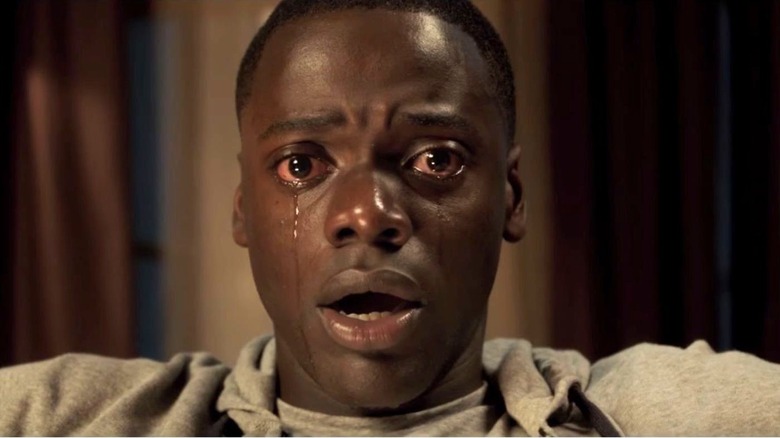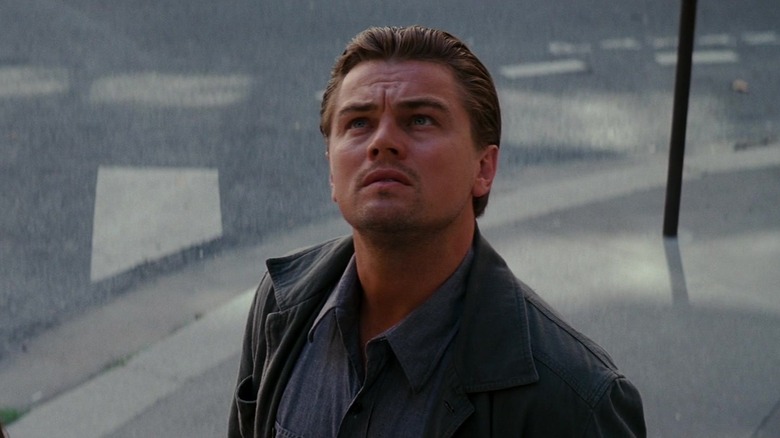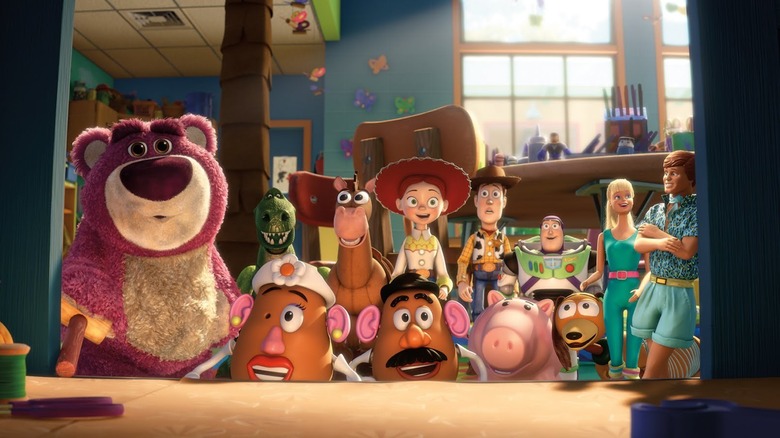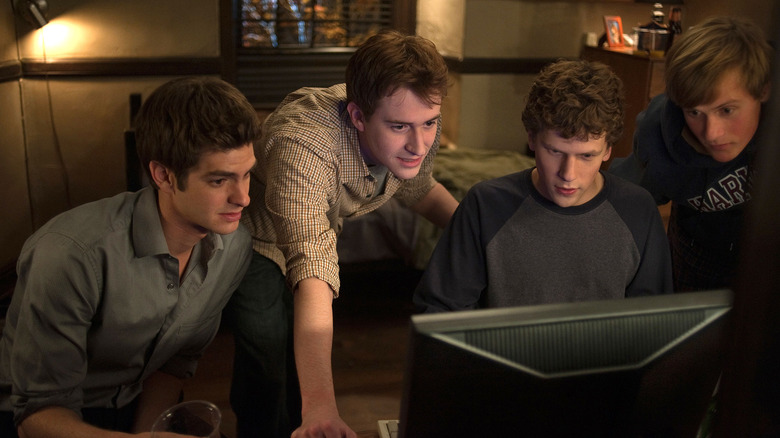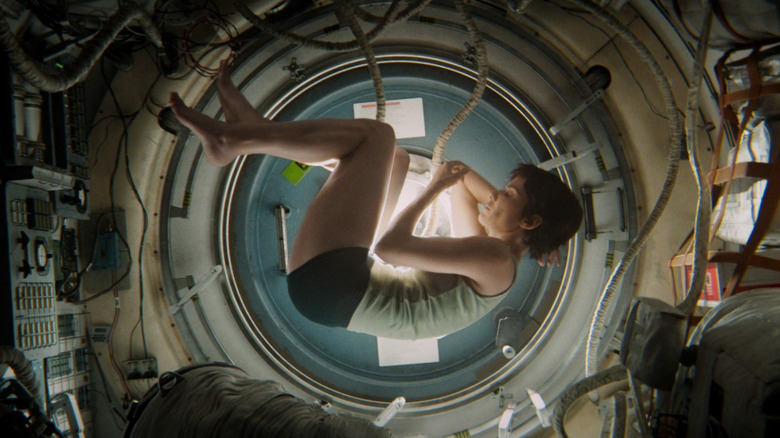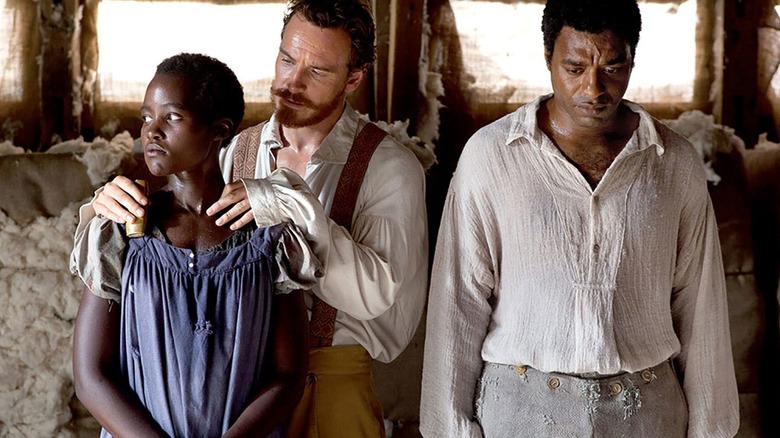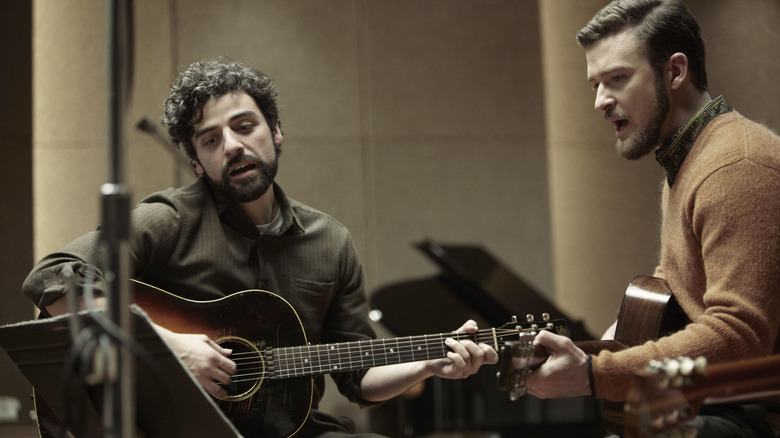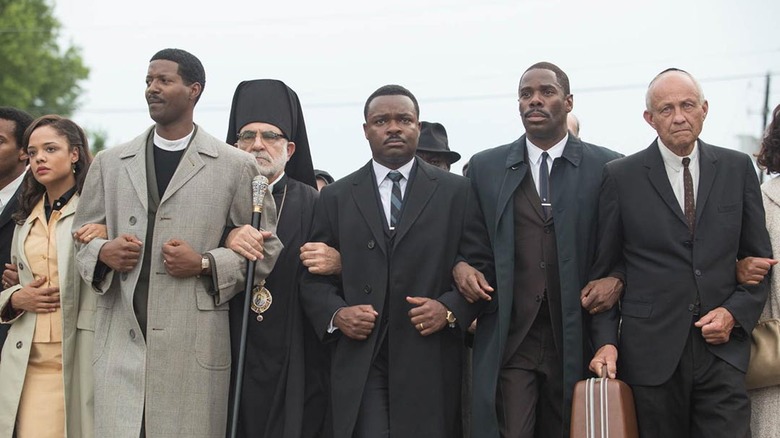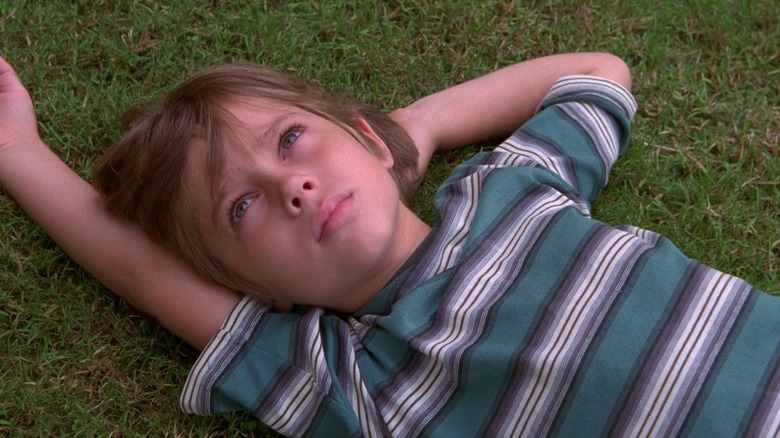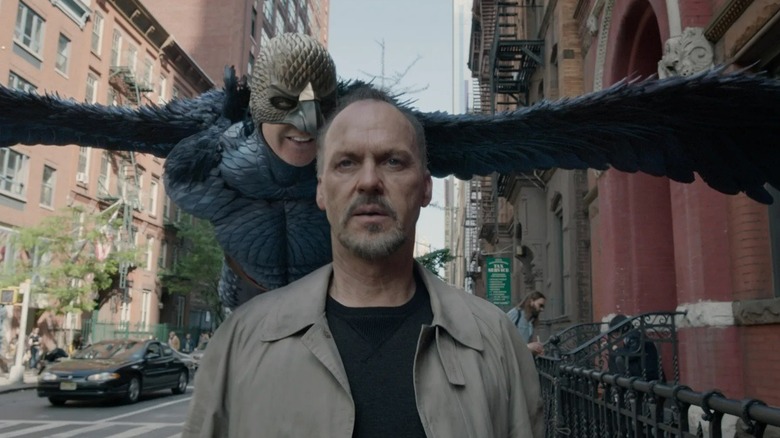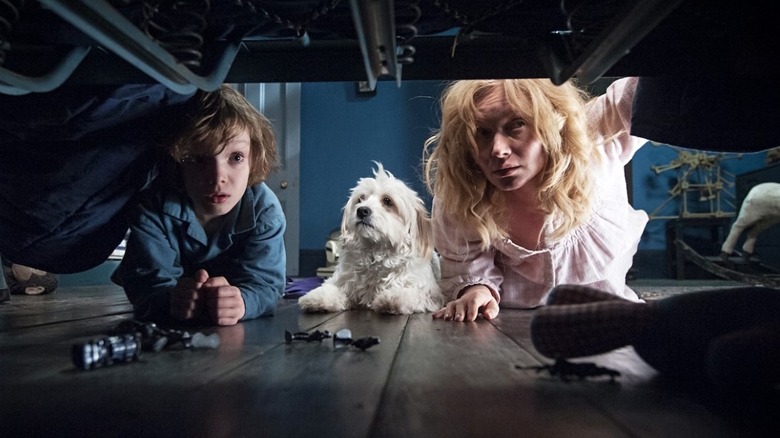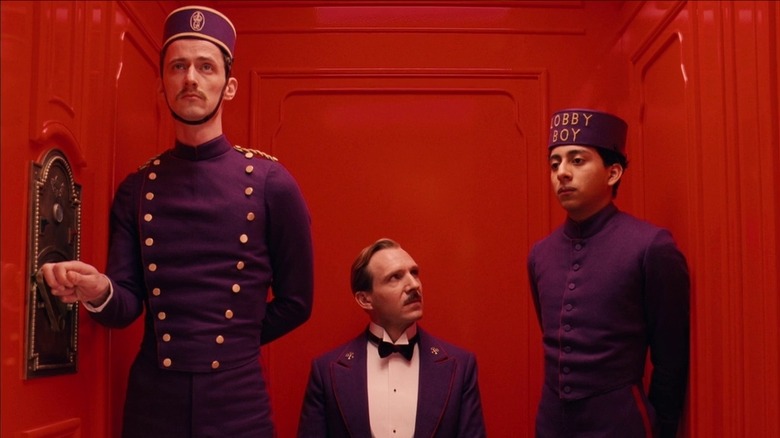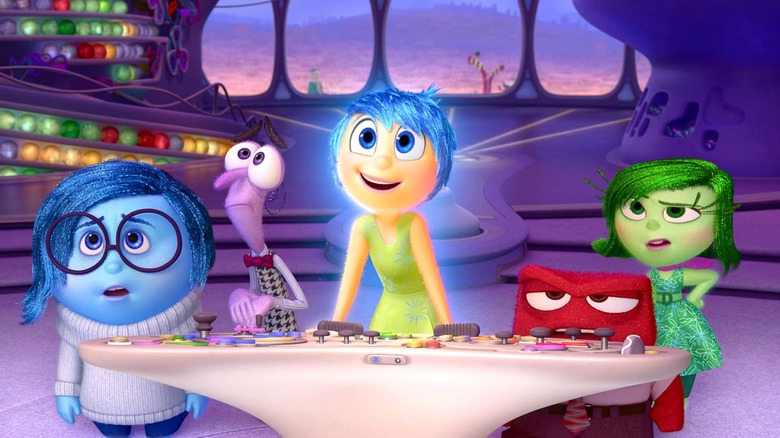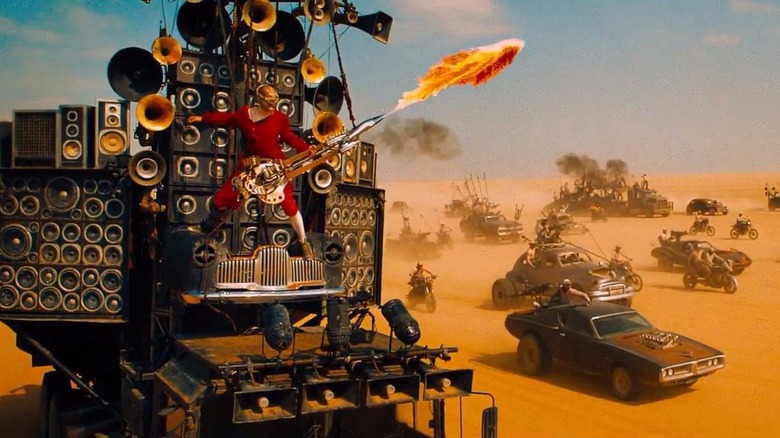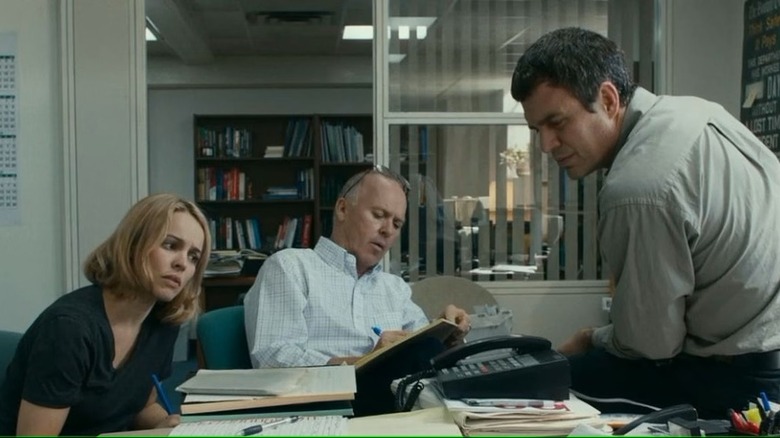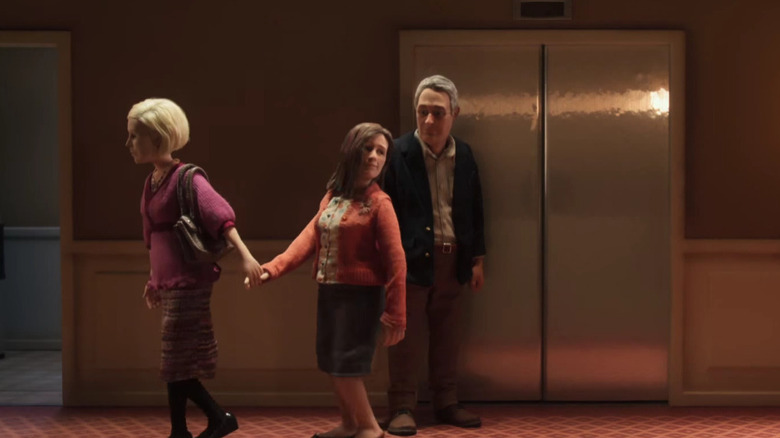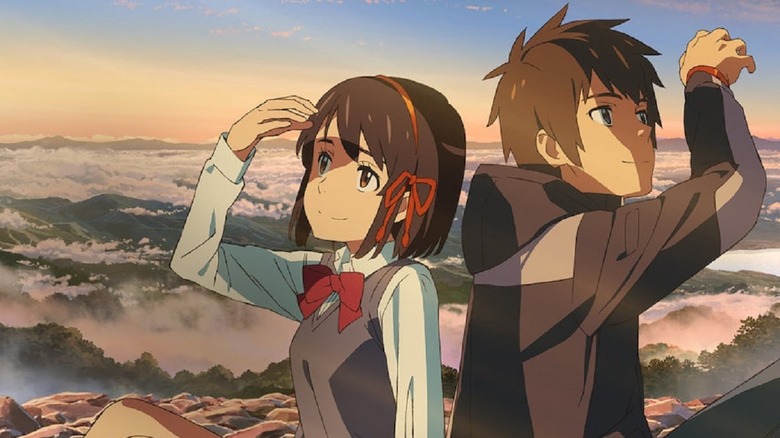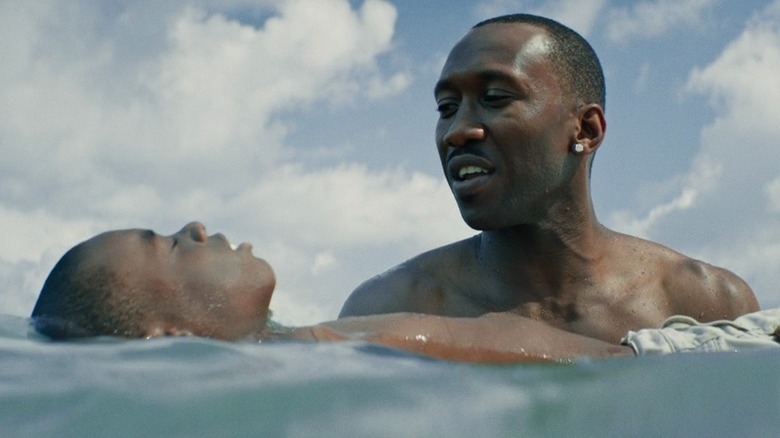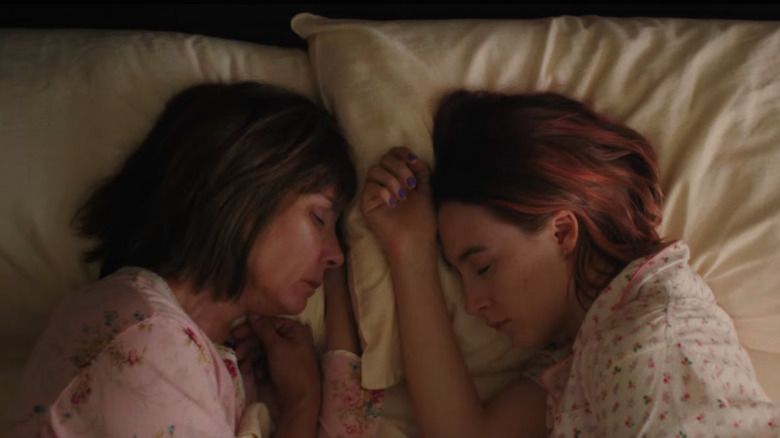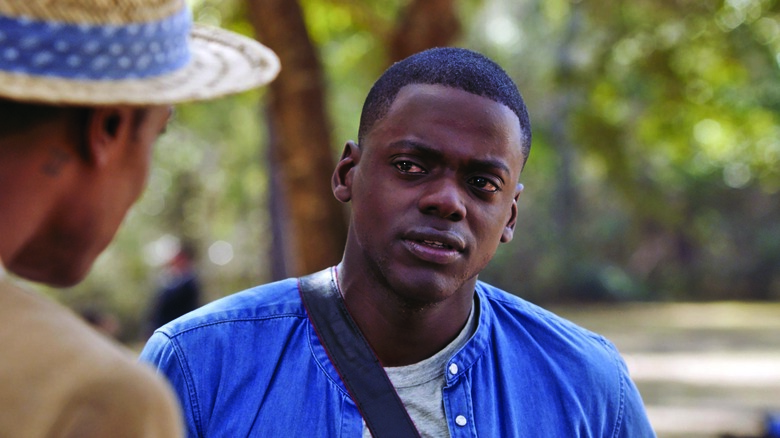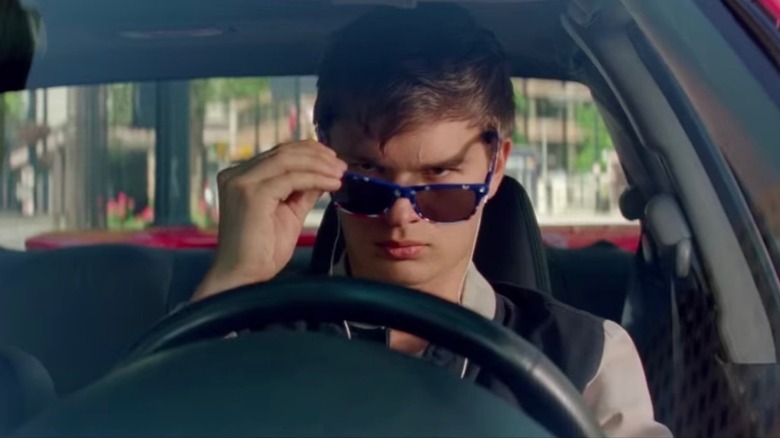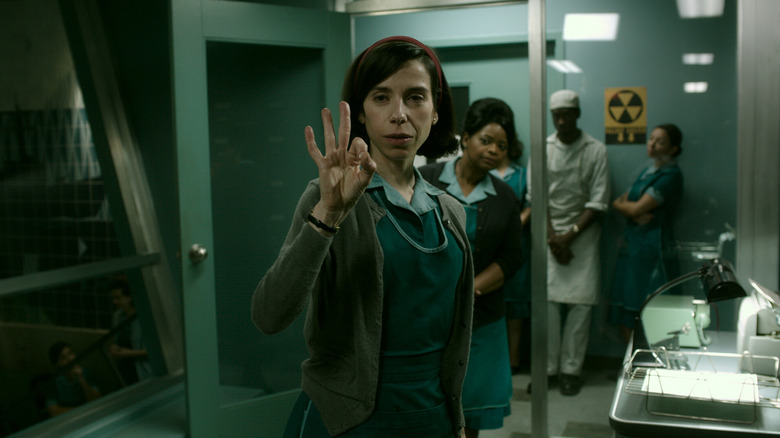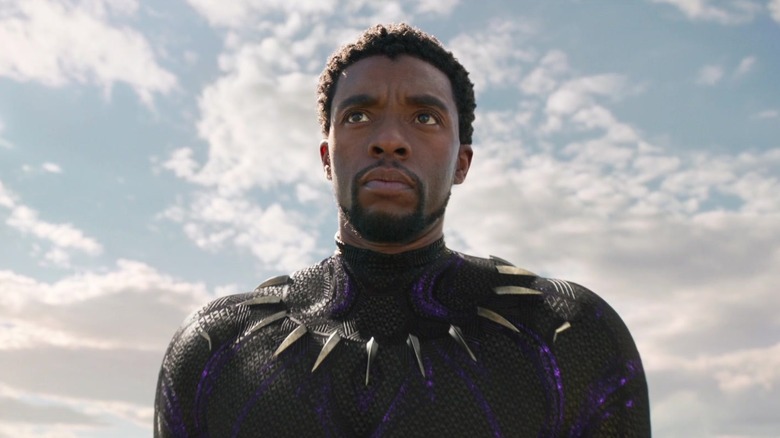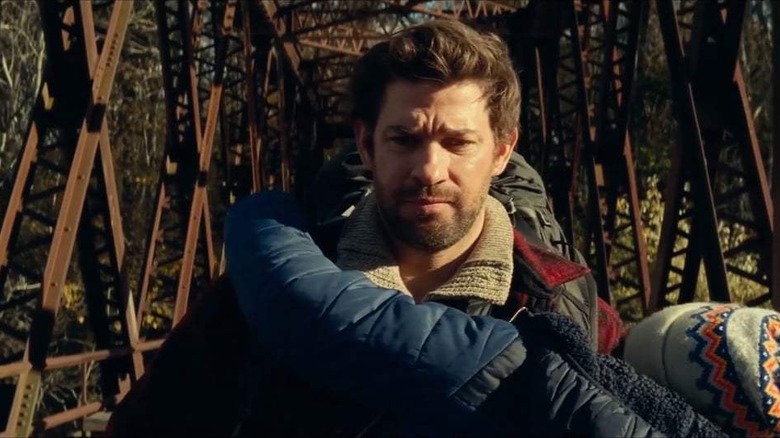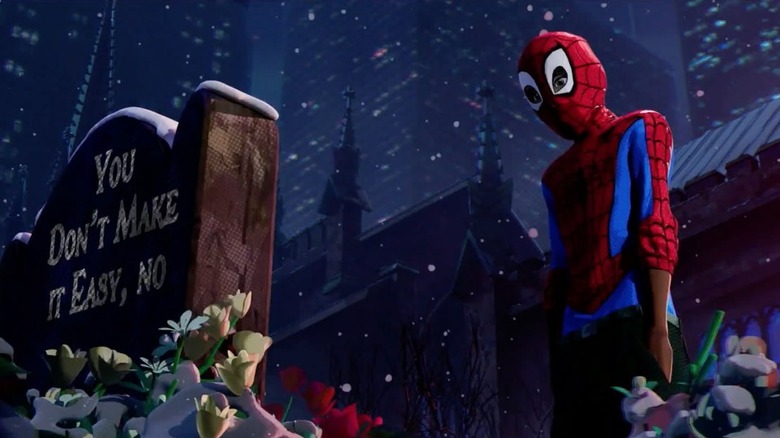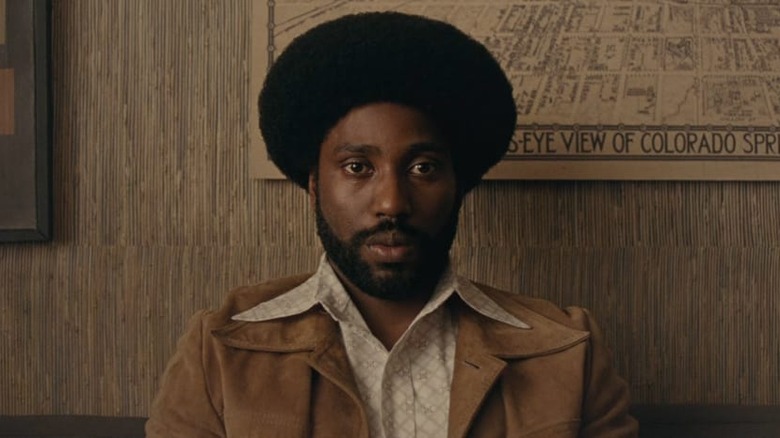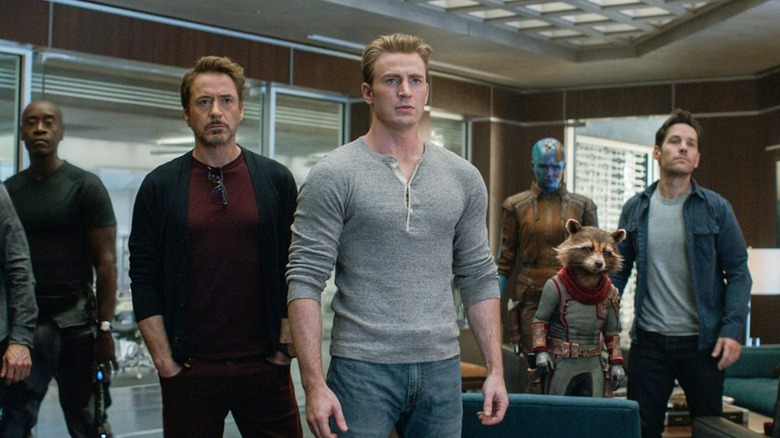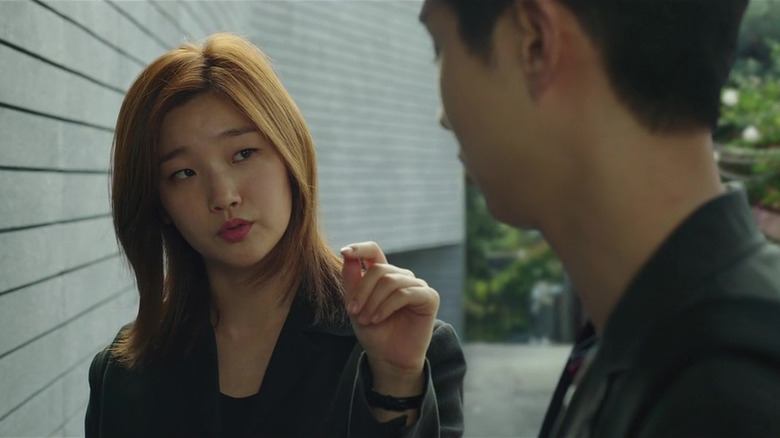The 30 Best Movies Of The Last Decade
As we continue through the 2020s, it's worth remembering that there were plenty of incredible movies that came out between 2010 and the end of 2019. From outstanding animated outings and over-the-top action set pieces to quiet dramas and Marvel movies, this decade boasts some extraordinary films — so much so that narrowing the list down at all was a fairly difficult feat.
Ultimately, we had to whittle down the huge list of films released in the past 10 years, and while that was no easy feat, this list is a pretty definitive selection of the films that, well, defined the entire decade, made artistic strides, and cemented themselves in cinematic history. From superhero flicks that redefined the genre to arthouse films and psychological thrillers, these are the absolute best, most iconic movies that came out in this action-packed decade. Some spoilers for these films to follow!
Inception (2010)
After reinventing the superhero genre with his "Dark Knight" trilogy, acclaimed director Christopher Nolan continued his celebrated cinematic streak with 2010's "Inception." An original story written and directed by Nolan (and produced alongside his wife Emma Thomas), "Inception" tells the twisting, turning tale of Dom Cobb (Leonardo DiCaprio), an "extractor" who can explore people's subconscious states and pull information for his clients. When faced with a job from Mr. Saito (Ken Watanabe) that could clear his criminal record and let him return to his wife and children, Cobb assembles a crack team, including Arthur (Joseph Gordon-Levitt), Ariadne (Elliot Page), and Eames (Tom Hardy). From there, they must break into the mind of Robert Michael Fischer (Cillian Murphy) and convince him to dissolve his father's company.
With a cast rounded out by accomplished actors like Michael Caine, who plays Cobb's father-in-law, and Marion Cotillard, who plays Cobb's long-lost wife, "Inception" employs incredible practical effects mixed with classic Edith Piaf songs and a cleverly written story that leaves viewers wondering about the truth long after the movie ends (that purposefully vague spinning top remains one of cinema's greatest mysteries). All in all, thanks to Nolan, the decade was already defined by stellar films like "Inception."
Toy Story 3 (2010)
The first "Toy Story" set a standard in 1995 — not just for Pixar films, but for all animated movies — and though a sequel probably seemed unnecessary at the time, "Toy Story 2" was released to universal acclaim in 1999. Though it took over 10 years for "Toy Story 3" to hit theaters, it was well worth the wait.
"Toy Story 3" took an entirely different approach to the now-familiar narrative about beloved toys Woody (Tom Hanks), Buzz Lightyear (Tim Allen), Jessie (Joan Cusack), and more, envisioning a time when their loving owner Andy (John Morris) doesn't need them anymore. As Andy sets off for college, his toys end up accidentally donated to a local daycare, where they're tormented by manic children all day. When they try to escape, it proves more difficult than they thought — including a harrowing and emotional sequence that sees everyone's favorite gang of toys heading for an incinerator at the end of a trash chute — but luckily, the story ends happily. Ultimately, the toys find their way back to Andy, allowing him to introduce each toy to his neighbor's young daughter, finding a new home for his lifelong friends and providing emotional, satisfying closure for both the film's characters and for the audience. "Toy Story 3" might have felt unnecessary, but in the end, it felt like a perfect closing chapter for the original trilogy (though "Toy Story 4" would follow years later in 2019).
The Social Network (2010)
When most people saw the first trailer for "The Social Network," the origin story of Facebook written by Aaron Sorkin and directed by David Fincher, it seemed almost ridiculous to make a "Facebook movie," but once the film hit theaters in September of 2010, naysayers were immediately proven wrong. A nominee for Best Picture (which would eventually go on to win Oscars for Adapted Screenplay, Editing, and Original Score), "The Social Network" starred Oscar nominee Jesse Eisenberg as Facebook founder Mark Zuckerberg, a Harvard student who inadvertently strikes social media gold just by trying to get back at an ex-girlfriend (Rooney Mara, in a small yet powerful role). However, as Facebook gets bigger and bigger, he finds himself corrupted by power and players like Sean Parker (Justin Timberlake), eventually ruining his friendship with Facebook co-founder Eduardo Saverin (Andrew Garfield, in his breakout role).
From its innovative framework, which flashes back to the founding of Facebook between two future lawsuits against Zuckerberg (one by Saverin and one by the Winklevoss twins, both played by Armie Hammer) to its outstanding script, direction, and performances, "The Social Network" remains more relevant than ever, even topping several best-of lists for not just the 2010s, but the 21st century so far. All in all, early 10 years later, it has cemented itself as one of the defining films of the entire decade.
Skyfall (2012)
Ever since Daniel Craig took over the role of James Bond in 2006's "Casino Royale," the 007 films have gotten sleeker and harder-hitting, and 2012's "Skyfall" (directed by Sam Mendes) remains a serious highlight in the Bond oeuvre. With Javier Bardem as the film's villain, Raoul Silva, "Skyfall" finds Bond fighting against an attack on MI6 by the dastardly Silva, who once worked for the British spy agency. As Silva tries to kill M (Judi Dench), the leader of MI6 and Bond's intrepid boss whom Silva believes betrayed him, Bond must work alongside fellow agents Eve Moneypenny (Naomie Harris) and Q (Ben Whishaw) to save her. Luckily, they're also joined by Gareth Mallory (Ralph Fiennes), a new addition to the franchise, who takes over the job of M from Dench, whose appearance in "Skyfall" is her last in the 007 series.
Beyond plenty of positive reception from critics upon its release, "Skyfall" also struck gold during awards season and at the box office. At the 2012 Academy Awards, British songstress Adele took home a statue for the film's original song, also titled "Skyfall," and when all was said and done, it became the first Bond movie to pass $1 billion at the box office. Casting a classically trained actor like Craig as 007 was definitely a smart choice, and it pays off in "Skyfall," giving audiences the highest-brow Bond in decades and elevating the entire franchise to prestige status.
Gravity (2013)
Director Alfonso Cuarón made his mark in the early aughts with films like "Children of Men" and "Harry Potter and the Prisoner of Azkaban," and his first big film in the 2010s, "Gravity," continued his successful creative streak. A hugely ambitious film set during a dangerous space mission, 2013's "Gravity" stars Sandra Bullock and George Clooney as Dr. Ryan Stone and Matt Kowalski, respectively, who find themselves completely stranded in space after debris strikes their space shuttle and kills everyone else on board. As the pair float through space and try to find their way to any remaining space shuttles that could return them safely to Earth, they discuss their personal lives and form a bond, which is tragically broken when Matt sacrifices himself so Ryan can live — which she does, eventually crash-landing back on Earth.
"Gravity" is, ultimately, an astounding cinematic accomplishment, combining groundbreaking special effects and an intimate, personal story told by just two actors, and its huge scope and touching story worked perfectly together. The film received widespread acclaim, with some even calling it the best movie of the year, and it was richly rewarded during the 2014 awards season, receiving 10 nominations at the Academy Awards (including Best Picture). It left the ceremony without the top prize but won seven statues, including Best Director for Cuarón and Best Cinematography for Emmanuel Lubezki, and remains one of the best space movies of the modern era.
Before Midnight (2013)
Film trilogies are typically relegated to genres like action-adventure and sci-fi, not indie romance dramas. And yet, filmmaker Richard Linklater's "Before" trilogy is a very real contender for best movie trilogy of all time. Beginning with 1995's "Before Sunrise," the films follow and mostly focus on just two characters — Jesse (Ethan Hawke) and Céline (Julie Delpy). In "Before Sunrise," the two characters meet for the first time and spend a day getting to know each other. In "Before Sunset," they reconnect for the first time after that magical day, with nine years having passed in real-time since they last saw each other.
"Before Sunset" is already impossibly great for what it is, but Linklater, Hawke, and Delpy had the gumption to try it yet again. Waiting another nine years, the trio put out "Before Midnight" in 2013. This time, the two leads had been a couple for most of the gap since "Sunset," and we check in on them as they're married with children. Relationships obviously look a lot different once they have to contend with real life and the honeymoon stage is a distant memory, and "Before Midnight" deals with that just as compellingly as the previous two entries.
While this one has a pretty high barrier of entry compared to most of this list — you have to watch the other two movies to get the most out of it — "Before Midnight" still more than earns its place among the 2010s' best.
12 Years a Slave (2013)
Quentin Tarantino's "Django Unchained" got a fair amount of criticism for taking the dark history of slavery in the United States and making it the backdrop for a bombastic revenge fantasy romp. So it was rather fortuitous timing that the very next year saw one of the most brutal and unflinching looks at that same subject that has ever been put on the big screen. It helps that "12 Years a Slave" was based on the memoir of a real-life Black man named Solomon Northup who was actually born free but was later kidnapped and manipulated into slavery as the movie depicts.
It's incredibly tricky territory to accurately portray without falling into exploitation or Oscar-baiting melodrama territory, and filmmaker Steve McQueen directs an incredible cast who all walk that line flawlessly. Chiwetel Ejiofor gives a knockout performance as Northup, as does Lupita Nyong'o as Patsey, another real slave whom Northup writes about in his book. And Michael Fassbender, in his third team-up with McQueen, is fearless in his portrayal of sadistic slaveholder Edwin Epps — also a real person. All three were nominated for well-deserved Academy Awards for their performances.
Nyongo'o won an Oscar for her performance, and "12 Years a Slave" also won best picture at the 86th Academy Awards. And that's all the more impressive when considering that it beat out heavy-hitters like "Dallas Buyer's Club," "The Wolf of Wall Street, "American Hustle," and "Gravity" to do so.
Inside Llewyn Davis (2013)
The Coen brothers have been making acclaimed, award-winning movies for decades, and in 2013, one of their most thoughtful and beautifully penned projects hit theaters. "Inside Llewyn Davis," which stars future "Star Wars" and Marvel star Oscar Isaac as the titular singer-songwriter, was written and directed by Joel and Ethan Coen and tells the twisting, winding tale of Davis' struggles to make it in the music business after his bandmate takes his life years before the film. Inspired by everything from James Joyce's "Ulysses" to the true story of musician Dave Van Ronk, "Inside Llewyn Davis" chronicles a particularly difficult week for Davis. During this week, he discovers that his illicit, married lover Jean (Carey Mulligan) is pregnant, records a song with her husband Jim (Justin Timberlake) and novelty musician Al Cody (Isaac's eventual "Star Wars" co-star Adam Driver), and more, including an ill-fated trip to Chicago. Throughout the journey, Davis spends his time chasing an orange tabby cat on a cyclical journey — and in a particularly obvious nod to Joyce, the cat's name is eventually revealed as Ulysses.
Beyond the fascinating and emotionally fraught story, the film is rounded out by original music crafted by Marcus Mumford (of Mumford & Sons) and T Bone Burnett, most of which is performed by Isaac himself. Ultimately, the movie tells the story of broken dreams and a hardscrabble life but still manages to provide an uplifting ending, making for an unforgettable filmgoing experience still beloved years after its release.
Selma (2014)
This decade was jam-packed full of historical biopics, but few left quite as strong of an impression as "Selma," the 2014 film that put director Ava DuVernay on the map. The true story of the 1995 marches from Selma, Alabama to the state's capital, Montgomery, "Selma" dramatizes one of the United States' most important and fraught historical moments, giving one of the most important moments of the civil rights movement the respect and due it always deserved.
The film stars David Oyelowo as Martin Luther King Jr., Common as James Bevel, Stephan James as John Lewis, and Wendell Pierce as Hosea Williams, the four public figures responsible for the march itself. The rest of the cast is fleshed out by talented performers like Carmen Ejogo as Coretta Scott King, Tim Roth as George Wallace, and Tom Wilkinson as President Lyndon B. Johnson, among others, boasting an impressive amount of star power. Ultimately, "Selma" builds to the moment King delivers his famous speech known as "How Long, Not Long" after President Johnson sided with the activists at the Alabama State Capitol. DuVernay became the first Black woman to have directed a film nominated for the best picture Oscar. The film also ended up winning an award for best original song, shared by star Common and singer-songwriter John Legend, who put the "O" in his eventual EGOT thanks to "Glory."
Boyhood (2014)
Plenty of films boast grueling and long-spanning filming schedules, but few movies have a behind-the-scenes process quite like Richard Linklater's "Boyhood." This 2014 film took a whopping twelve years to make, with production and filming beginning in 2001 and wrapping in 2013 between Linklater and his stars Ethan Hawke, Patricia Arquette, Ellar Coltrane, and Linklater's daughter Lorelei. As Mason Evans, Coltrane filmed pieces of the movie every single year for those 12 years, chronicling his growth from a child to an adult as his character's parents divorce and he faces the typical teenage stumbling blocks.
Considered one of the frontrunners for Best Picture at the 2015 Oscars, "Boyhood" ended up losing to "Birdman" — though Arquette walked away with a well-deserved award for best supporting actress — but its legacy is undeniable. After all, how many directors need a contingency plan for their film in case they die during a 12-year filming period? "Boyhood" might not have won Best Picture, but Linklater's ambitious project certainly paid off, placing him firmly on Hollywood's directorial A-list and remaining one of the most exceptional and unique films of the entire decade.
Birdman (2014)
By 2014, the Marvel Cinematic Universe was firing on all cylinders, making it the perfect year to release an anti-superhero movie. That's not to say that "Birdman" — full title, "Birdman or (The Unexpected Virtue of Ignorance)" — hates superhero movies in and of themselves. It's more a look at what happens when such fads inevitably run their course. And in particular, what happens to the people who had built their celebrity out of the shaky foundation of a temporary cinematic craze.
It's hard to think of a better person to play such a part than Michael Keaton. Sure, he did just fine after he played Batman in the 1989 movie and its sequel — particularly in the 2010s, when he had the biggest period of his career from a critical acclaim standpoint. But Keaton certainly has experience with spending time being primarily known as the face of a massive superhero franchise, and what it's like trying to move on to the next phase of your career and separate yourself from the character that you have become mostly closely identified with. The performance earned him his long-overdue first best actor Oscar nomination.
With masterful directing from Alejandro González Iñárritu — who also co-wrote — "Birdman" was filmed to look like one continuous take from start to finish. That gives the movie a breathless and manic nature as we watch Keaton's character slowly unravel mentally. Or not, depending on your reading of the brilliantly ambiguous final shot.
The Babadook (2014)
Most people are in agreement that genuine horror beats out cheap jump scares by a mile. But the latter is a lot easier to pull off, offers more immediate gratification, and makes for better memes — so that's what the world tends to get on screen far more often. So whenever a movie like "The Babadook" comes along that takes its time in delivering truly terrifying horror, the type that only seems to come along once in a generation, the world takes notice. William Friedkin, director of "The Exorcist," said as much in a series of tweets about "The Babadook" — he not only put it on the same level as genre trailblazers "Psycho" and "Alien," but declared, "I've never seen a more terrifying film than THE BABADOOK."
Written and directed by Australian filmmaker Jennifer Kent based on her own short film, "The Babadook" has a conceit that might not sound entirely groundbreaking on paper. A child (Noah Wiseman) tries to convince his mother (Essie Davis) that a monster from one of his books has come to life and is haunting their home — and she eventually finds out that he isn't lying. The titular monster itself is effectively scary on its own and would've served a lesser, more shallow horror movie just fine. But "The Babadook" goes beyond by also having undercurrents of mental health, grief, and other heady issues that serve as the foundation for true classics of the genre. And time will prove that "The Babadook" is certainly that.
The Grand Budapest Hotel (2014)
Wes Anderson has been a cinematic staple for years thanks to his distinctive visual style and clever storytelling techniques, and in 2014, he outdid himself with his period piece "The Grand Budapest Hotel." Using a multilayered narrative involving an author (played as a young man by Jude Law) who meets with an elderly hotel proprietor named Mr. Moustafa (F. Murray Abraham), Anderson skillfully weaves the story of M. Gustave (Ralph Fiennes), who worked as a concierge at the historic and beautiful Grand Budapest Hotel in the 1930s, and his friendship with lobby boy Zero (Tony Revolori).
Gustave prides himself on his perfect service and impeccable care of the hotel, but after an affair with one of the hotel's older residents goes wrong, he is framed for murder and must go on the run. Before Gustave is imprisoned, he and Zero do manage to steal one of the deceased wealthy woman's paintings, "Boy with Apple," while her family searches for it fruitlessly. Ultimately, both of their stories end in tragedy, but it's one of Anderson's most complete, complicated, and emotionally rich journeys. Nominated for best picture at the 2015 Academy Awards — the first time one of Anderson's film has been nominated for the grand prize — "The Grand Budapest Hotel" is an exemplary example of Anderson's prowess as a filmmaker, and it remains endlessly rewatchable to this day.
Inside Out (2015)
Pixar's cinematic track record is pretty much perfect, but one of the studio's very best films, especially throughout the 2010s, is Academy Award-winner "Inside Out." The film is an original story conceived by Pixar stalwart Pete Docter, which gives the audience a glimpse into the complicated mind and memory of an 11-year-old girl named Riley. Inspired by his own daughter, Docter crafted a touching and deeply moving story about Riley's core emotions — Joy (Amy Poehler), Fear (Bill Hader), Anger (Lewis Black), Disgust (Mindy Kaling), and Sadness (Phyllis Smith) — as she transitions from a cheerful child to a more complex, confused pre-teen on the road to adulthood. When Sadness interferes with one of Joy's core memories, the two end up thrown into the vast and constantly changing landscape of Riley's mind, leaving them stranded until they can find their way back to their headquarters and help Riley get through a cross-country move and a new school.
Despite its seemingly sunny exterior, "Inside Out" is, at its core, a film that tells children and adults alike that it's okay to be sad. As such, it's a relatable and emotional viewing experience for audience members of absolutely any age. Add in outstanding guest turns from actors like Richard Kind and Kyle McLachlan as well as ground-breaking animation, and you've got one of Pixar's finest turns since it broke onto the scene in the 1990s with "Toy Story."
Mad Max: Fury Road (2015)
An action movie spin-off of Mel Gibson's classic "Mad Max" franchise probably seems like an unlikely inclusion on this list — as well as a very unexpected Oscar contender — but George Miller's fourth movie in the "Mad Max" series, "Fury Road," ended up breaking an astonishing amount of barriers in the aftermath of its 2015 release.
Starring Tom Hardy, who took over Mel Gibson's titular role, alongside Charlize Theron as Furiosa (one of the best action heroines in recent memory), this blazing, blindingly-paced action movie delighted critics and fans alike, with many calling it one of the best action films of all time. To the surprise of many, it even made its way into the crowded and prestigious pack of nominees at the 2016 Academy Awards, with an incredible 10 nominations and six wins in technical categories (including an editing win for Miller's wife, Marget Sixel), making it the biggest winner of the night. Though it seems like a true awards underdog on the surface, the truth is that "Mad Max: Fury Road" is both an outstanding dystopian action set piece and a perfect allegory for the modern world, bolstered by excellent performances, jaw-dropping visuals, and sharp direction that absolutely belongs on a list of the best films of the decade.
Spotlight (2015)
It's territory that most have long been afraid to go near, and relatively few still do to this day in any major mainstream way: the alleged history of rampant misconduct by Catholic priests against children, and church leadership's tendency to cover it up. But in the early 2000s, a team of reporters at The Boston Globe launched one of the biggest investigations on that very subject ever undertaken by a single media outlet. In the face of much opposition — and the September 11th terror attacks temporarily putting the story on the backburner — the team carries on and eventually publishes an exhaustive and damning report against the Boston Archdiocese.
While the original players deserve the lion's share of the respect for their bravery in covering such controversial ground, it's also worth praising those who weren't afraid to make a movie about that investigation. Redeeming himself from 2014's dreadful Adam Sandler comedy "The Cobbler," writer-director Tom McCarthy crafts a tight biographical drama in "Spotlight," buoyed by an amazing ensemble, each of whom turns in some of the best performances of their respective careers. Michael Keaton continued his stellar 2010s career renaissance here, and although it didn't bring him his second Oscar nom, it brought Rachel McAdams her first and Mark Ruffalo — who was also having quite the critical darling moment at the time — his third. As for Academy Awards "Spotlight" actually did win, it took him two of the biggest trophies for the movie itself — best original screenplay and best picture.
Anomalisa (2015)
Technically, 2024's "Orion and the Dark" wasn't filmmaker Charlie Kaufman's first animated movie. That distinction belongs to "Anomalisa," a stop motion film released in 2015 and only his second time in the director's chair. But unlike "Orion," don't sit down with the kiddos to watch "Anomalisa" — beyond it being a complex, introspective psychological dramedy that will fly right over their heads, things will get a bit awkward when the movie delivers a no-punches-pulled, shockingly realistic scene of intimacy.
That being said, don't mistake "Anomalisa" as being a movie for adults the same way fellow puppet-starring movie "Team America: World Police" is. "Anomalisa" is a Charlie Kaufman movie through and through — deliberately paced, thought-provoking, emotionally complex, and centering on characters riddled with anxiety. It follows a man named Michael (David Thewlis) who is pessimistic and cynical yet is somehow a motivational speaker specializing in customer service. During one of his talks, he meets Lisa (Jennifer Jason Leigh), and in their getting to know each other, she calls herself an anomaly — and thus, he nicknames her "Anomalisa."
Oh, and it's probably worth mentioning that every single other character in this movie — male and female — is voiced by actor Tom Noonan, because why not? It's a Charlie Kaufman movie. You just go with it. "Anomalisa" is the only movie he released in this entire decade, but given the amount of work that surely went into it, that's understandable. And also completely worth it.
Your Name (2016)
Anime and non-anime movies aren't typically put together in the same best-of lists. But that shouldn't be the case, especially when talking about a movie like the brilliant "Your Name," which is more than worthy of being considered one of the decade's best movies, animated or otherwise.
One of the biggest box office successes of all time in its native Japan, "Your Name" also did very well worldwide with both audiences and critics. Holding an impressive 98% on Rotten Tomatoes, the movie is a romance, a body-swap comedy, and a time travel fantasy all at once, while also touching a bit on gender identity. And acclaimed anime filmmaker Makoto Shinkai skillfully balances it all, never letting the ambitious scope overwhelm the sweet love story at the center. Rural high school girl Mitsuha (Mone Kamishiraishi in the original Japanese) fantasizes about being a boy in the big city, and she gets her wish when she switches bodies with a boy named Taki (Ryûnosuke Kamiki) who lives in Tokyo. As the two figure out ways to communicate with one another and set up various boundaries for sharing each other's bodies and lives, they begin to fall in love.
To say any more than that would be to spoil the magical journey that "Your Name" takes viewers on, which feels like an almost completely different movie by the end (in a good way). It's a rare popular anime film not made by Studio Ghibli that will soften even the staunchest of anime avoiders.
Moonlight (2016)
"Moonlight" had already earned plenty of fame and acclaim by the time the Academy Awards aired in early 2017, but this best picture contender is likely best known for the now infamous mix-up over the night's biggest winner. At the very end of the ceremony, Warren Beatty and Faye Dunaway presented Best Picture to "La La Land," the film's biggest competitor, only to cause an uproar when one of the producers of "La La Land" turned the envelope toward the camera to reveal the actual winner: "Moonlight," the 2016 coming of age film directed by Barry Jenkins.
However, if that's the only reason you remember "Moonlight," you may want to rewatch this incredible, moving film and let it stand on its own apart from the famous Oscars snafu. Many have ranked this film as one of the best films of the decade, and it's not surprising why; the story of Chiron, nicknamed "Little," as he grows up and comes to terms with his identity and sexuality, is all-encompassing, highly emotional, and relatable to everyone who watches the movie. Mahershala Ali earned his first Oscar (for best supporting actor) for the film, and ultimately, there's no question at all that the Academy really did make the right call by anointing "Moonlight" as the best movie of the year.
Lady Bird (2017)
As with "Moonlight," coming-of-age stories are always a relatable way to reach an audience, and the 2017 film "Lady Bird," directed by actress-turned-director Greta Gerwig, followed that same path. The "Barbie" director and her leading ladies, Saoirse Ronan and Laurie Metcalf, all received Oscar nominations — Gerwig for original screenplay and director, and Ronan and Metcalf for leading and supporting actress, respectively — and it's easy to see why when you experience this gripping, funny, and emotional film. Ronan, who plays the title role, perfectly portrays a willful and stubborn teenager who chooses to go by "Lady Bird" (rather than her given name, Christine) while trying to escape her California hometown and her well-meaning mother (Metcalf). The cast, rounded out by Beanie Feldstein, Timotheé Chalamet, Lucas Hedges, and Tracy Letts, is exceptional, making this a pitch-perfect film for anyone who has ever struggled to find themselves growing up.
It's an unfortunate fact that very few women have won an Academy Award for best director — Kathryn Bigelow was famously the first-ever winner for her 2008 film "The Hurt Locker" — so it's always a pleasant surprise when a female-led film earns its spot as one of the best films of the year. Gerwig, however, surpassed all expectations; "Lady Bird," a movie directed by a woman and starring powerful women, wasn't just one of the best films of 2017, but one of the overall best of the entire decade.
Get Out (2017)
Jordan Peele's directorial debut came as somewhat of a surprise, considering that the comedian-turned-director cut his teeth on the sketch comedy series "Key & Peele", but by the time "Get Out" hit theaters in 2017, there were no doubts left about Peele's talent as a filmmaker. Written and directed by Peele, "Get Out" offers up a searing indictment of race relations and fetishism in modern America. The film seems simple at first: Chris (Daniel Kaluuya) goes with his girlfriend Rose (Alison Williams) to visit her family for the weekend, and while he's nervous about Rose introducing her black boyfriend to her white parents Dean (Bradley Whitford) and Missy (Catherine Keener), everything goes pretty smoothly. However, it quickly takes a turn once he realizes that Dean and Missy have sinister motives — and beyond that, he isn't the first of Rose's boyfriends or partners to meet the same horrible fate they have planned for him.
Peele's social satire was an immediate hit thanks to its brilliant story, powerful performances, and sharp direction, and the Academy took notice. Though "Get Out" didn't win best picture at the 2018 ceremony, it was one of the nominees — Kaluuya also snagged a well-deserved nomination for best leading actor — and ultimately, Peele walked away with best original screenplay, making him the first African-American artist to win the award and confirming his status as a major talent to watch for years to come.
Baby Driver (2017)
It needs to be addressed right off the bat that this movie stars two actors who have since become extremely problematic figures whose careers were derailed by personal scandals that retroactively tainted anything they have been involved in. But don't hold the presence of actors Kevin Spacey or Ansel Elgort against "Baby Driver" — for what it's worth, neither had any publicly known misconduct allegations levied against them at the time of the movie's production.
Unfortunately necessary preamble aside, vehicular heist romp "Baby Driver" is one of the best action movies of the millennium so far. Not only are the exhilarating car chases and set pieces almost entirely CGI-free, but the characters are fully fleshed out, and the script is smartly written. Few movies in this genre released in the last couple of decades can make even two of those claims, let alone all three. Written and directed by Edgar Wright, "Baby Driver" hearkens back to the car-based action spectacles of yesteryear while also bringing in enough modern elements to keep it from being purely a nostalgia grab.
Beyond the actors we won't name again is an incredible cast that includes Lily James, Jon Hamm, Jamie Foxx, and Jon Bernthal all clearly having the time of their lives, which seems to be a common occurrence on Wright's film sets. We need more filmmakers like him, who remind us that movies are supposed to be fun for both the performers and the audience alike.
The Shape of Water (2017)
2017 was a solid year for cinema, with plenty of worthy nominees vying for the title of best film of the year, and according to the Academy, Guillermo del Toro's groundbreaking fantasy movie "The Shape of Water" was the best of the best. The star-studded cast features acclaimed actors Sally Hawkins, Michael Shannon, Academy Award-winner Octavia Spencer, Richard Jenkins, del Toro regular Doug Jones, and Michael Stuhlbarg, and the film tells the story of a mute government worker (Hawkins) in a secret facility who forms a, well, fairly unnatural attachment with a fish-human hybrid (played by Jones).
After the success of 2006's "Pan's Labyrinth," it's no surprise that del Toro could produce another fantastical, otherworldly story, and audiences and critics alike took notice. Not only did "The Shape of Water" win the coveted Golden Lion award at the 2017 Venice Film Festival, but it earned a whopping 13 nominations at the 2018 Academy Awards, eventually winning statues for director (for Del Toro) and best picture. In the end, this unconventional story of unlikely love, acceptance, and compassion is a tale for the ages, and del Toro's vision remains a classic.
Black Panther (2018)
Marvel has made plenty of groundbreaking films ever since the Marvel Cinematic Universe officially launched in 2008 with "Iron Man." But one of its most revolutionary ventures was 2018's "Black Panther," a film directed by Ryan Coogler that features Marvel's first black superhero and a powerhouse cast of actors of color. Chadwick Boseman played T'Challa, known as the Black Panther, in "Captain America: Civil War," and in "Black Panther," the character is prepared to take the throne after his father's death, but before long, he ends up thwarted by his cousin Killmonger (Michael B. Jordan), one of the MCU's best villains to date. With a cast rounded out by Lupita Nyong'o and Forest Whitaker alongside legends like Angela Bassett and newcomers like Winston Duke and Letitia Wright, "Black Panther" made its mark in the MCU, especially thanks to its smart script and direction from Coogler.
Ultimately, "Black Panther" set a new standard for not just diversity in superhero films, but superhero movies as a whole, thanks to its complex villain, perfect performances, and thoughtful direction. As one of the 2019 nominees for best picture (and the first superhero film to achieve that accolade), "Black Panther" was a huge step for both Marvel and the superhero genre, providing a big highlight for the MCU.
A Quiet Place (2018)
After his nine-season run on "The Office" as Dunder-Mifflin's lovable irreverent goofball Jim Halpert, nobody thought John Krasinski would end up making one of the best horror films of the decade — but in 2018, "A Quiet Place" proved that he had the chops to make an excellent and original thriller for the ages. Krasinski stars in the film alongside his real-life wife Emily Blunt, an accomplished talent in her own right, as the parents of a family in a dystopian world who must evade monsters that respond to sound of any kind. In this world, Evelyn (Blunt) and Lee (Krasinski) try to keep their children safe, but after their four-year-old son dies, they have to tread carefully, especially because Evelyn is in the final stages of her pregnancy.
From the film's innovative use of sign language and a prominent deaf actor (Millicent Simmonds, who plays the family's daughter Regan), "A Quiet Place" made significant strides for the deaf community as well as presenting a new and original horror story that can stand the test of time. Thanks to Krasinski's clever script and direction, "A Quiet Place" has earned its place as one of the best movies of the decade.
Spider-Man: Into the Spider-Verse (2018)
Since the start of the 21st century, some might argue that there have been far too many "Spider-Man" adaptations, but 2018's animated venture "Spider-Man: Into the Spider-Verse" was certainly a welcome addition to the canon. The 2019 Academy Award-winner for Best Animated Feature, "Into the Spider-Verse" is based on the modern-day Spider-Man comic book character Miles Morales, an Afro-Latino teenager who discovers his identity as Spider-Man amongst several other Spider-Men who join him from other realms.
After another Spider-Man, Peter Parker (voiced by Chris Pine) tragically dies, several other figures appear to take up his mantle, including Morales, Peter B. Parker (Jake Johnson), Gwen Stacy slash Spider-Woman (Hailee Steinfeld), and superheroes who arrive from other dimensions, including Spider-Man Noir (Nicolas Cage), SP//dr: (Kimiko Glenn), and, of course, Spider-Ham (John Mulaney). Together, they must fight against forces like Olivia Octavius, or Doctor Octopus (Kathryn Hahn), crime boss Wilson Fisk (Liev Schrieber), and Miles' own uncle, Aaron Davis (Mahershala Ali), who masquerades as the Prowler. Between the film's varied and groundbreaking animation techniques and multilayered storytelling, there's no doubt that it belongs among the top films of the decade, and audiences can only hope that future animators follow in its footsteps to tell their own stories.
BlacKkKlansman (2018)
Acclaimed director Spike Lee has been making great films for decades, but thanks to a seriously unbelievable true story, he struck cinematic gold in the 2010s with "BlacKkKlansman." Telling the surreal yet true story of Ron Stallworth (played by Denzel Washington's son John David Washington), an African-American detective in Denver's police department who infiltrates the Ku Klux Klan over the phone, most viewers probably would never believe that this story is based on an entirely true experience, but Lee adapted Stallworth's story from the detective's book "Black Klansman," putting his own spin on the title.
As Stallworth, the first black detective in Colorado Springs' police department, gets further into his deception against the KKK, he enlists a fellow officer, Flip Zimmerman (Adam Driver), to pose as him at KKK meetings while the hateful organization prepares for an attack in Colorado. In the meantime, Stallworth continues to curry favor with David Duke himself (played by Topher Grace), the Grand Wizard of the KKK, as he works to take the entire operation down. Lee might not have won Best Picture for "BlacKkKlansman" — though he was nominated — but he did take home an Academy Award for Best Adapted Screenplay, earning the lauded director his first competitive Oscar. Ultimately, this award proved that this outlandish yet extremely real story resonated with audiences and critics alike, making "BlacKkKlansman" yet another Spike Lee classic.
Roma (2018)
A streaming movie being a prestige picture that racks up major critical acclaim and gets Oscar nominations isn't shocking, headline-grabbing news anymore. But in the 2010s, it still was, and 2018's "Roma" was one of the films that helped streaming service originals turn that corner into being accepted, praised, and rewarded on the same level as their theatrically released counterparts.
Written and directed by Alfonso Cuarón — who makes his second appearance on this list after "Gravity" — "Roma" sees the filmmaker return to a more intimate, character-driven fair after several big-budget action flicks and a "Harry Potter" sequel. While it did get a limited theatrical run in part to ensure its Academy Award eligibility, "Roma" was still primarily a Netflix film, and it certainly upped the streamer's cinematic credibility. A semi-autographical story about Cuarón's Mexico City childhood, "Roma" was also shot and edited by the filmmaker as well, making it not only his most personal movie but the one he played the largest role in the production of as well.
While it wouldn't be until 2022's Apple TV+ original "Coda" made history as the first to win best picture, Cuarón took home the first-ever best director and best cinematography Oscars for a streaming movie with "Roma." Streaming movies have been fixtures at the Academy Awards ever since, and they owe Cuarón and "Roma" a debt of gratitude for blazing that trail.
Avengers: Endgame (2019)
The Marvel Cinematic Universe is one of the biggest presences in film today, and as its third phase came to a close, "Avengers: Endgame" became one of the most anticipated films of the decade, especially after the cliffhanger left behind by its predecessor. In 2018's "Avengers: Infinity War," half of the MCU's major characters fell prey to the "Snappening," when Thanos (Josh Brolin) turned half of the planet's living population to dust with a simple snap of his fingers, and in "Endgame," the goal is to track down those missing heroes and return them to the human realm.
Eventually, after some pretty complicated efforts, Captain America (Chris Evans), Tony Stark (Robert Downey Jr.), and their cohorts are able to fill out Thanos' Infinity Gauntlet themselves through some nifty time travel, but ultimately, a price must be paid. During the film's gargantuan final battle, Tony sacrifices himself by snapping the Gauntlet himself, demolishing Thanos' army and killing himself, ending Iron Man's arc in the MCU and providing a satisfying conclusion to this chapter of the franchise. Somehow, "Endgame" serves as both a huge action movie and an emotional tentpole for the MCU, and as it bridged that gap, it also cemented itself as one of the best cinematic efforts of the year — as well as one of the highest-earning films of all time.
Parasite (2019)
Foreign language films rarely stand a chance in the North American box offices, but at the end of 2019, Bong Joon-Ho's "Parasite" made a huge splash, selling out screenings across the country and marking itself as a must-see movie thanks to its mysterious marketing and twisting, turning narrative. Upon its premiere in May of 2019 at the Cannes Film Festival, "Parasite" took home the coveted Palme d'Or with a unanimous vote, proving that it was the film to watch out for as the year continued.
The less that's said about the film's plot, the better — while some films can benefit from light spoilers, this is not one of them — but all that you need to know is that this exquisitely shot and carefully plotted film focuses on class differences between an impoverished family, the Kims, in South Korea and an extraordinarily wealthy family, the Parks, who end up hiring the entire Kim family as their servants. From there, the film takes several turns that we'd rather not reveal; ultimately, all that you need to know about "Parasite" is that once you see it, you're unlikely to forget it anytime soon, which is why it's beloved by critics and fans across the world.
